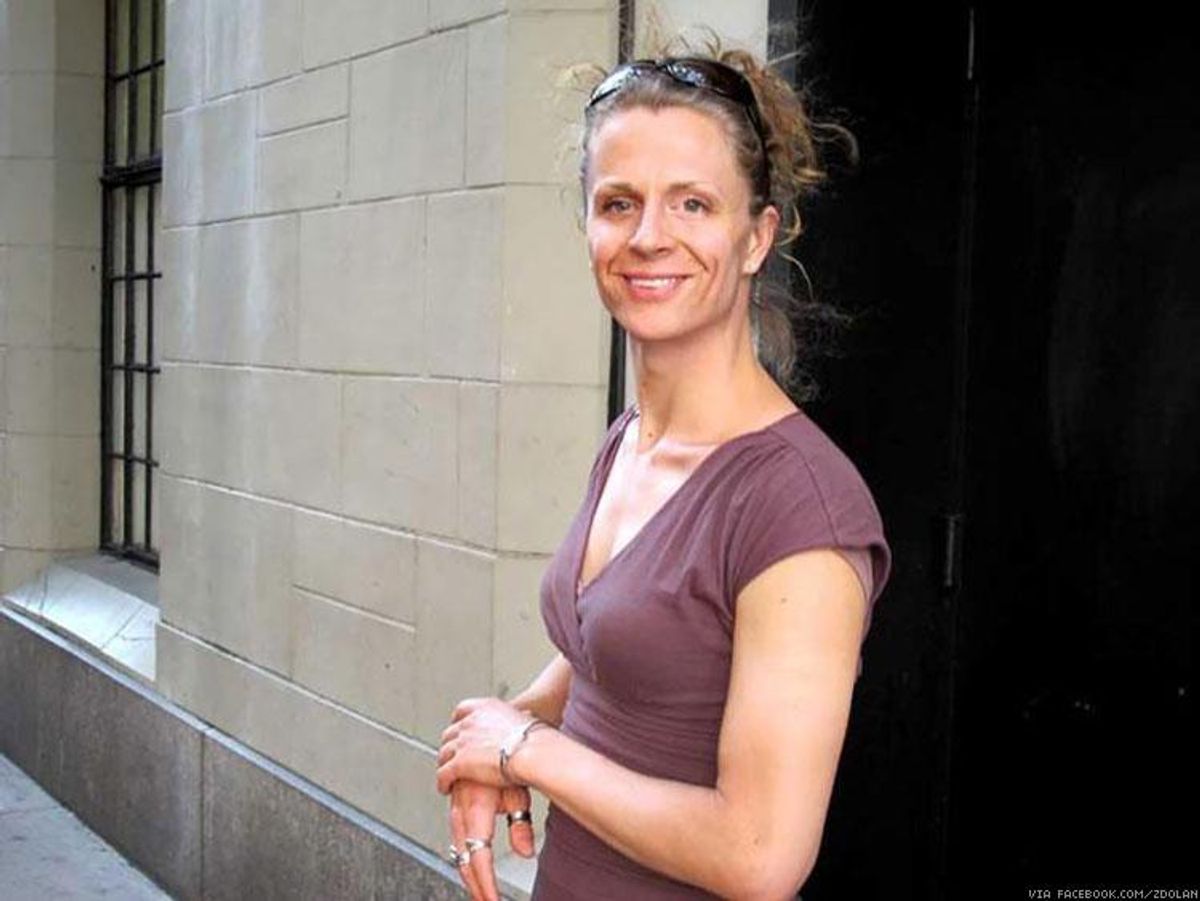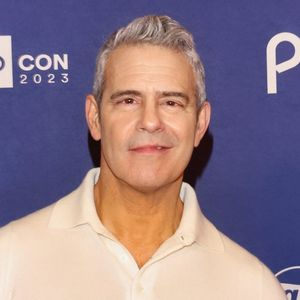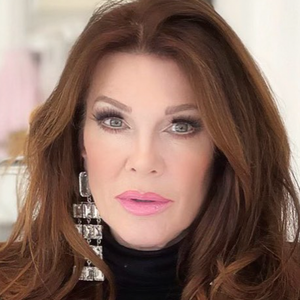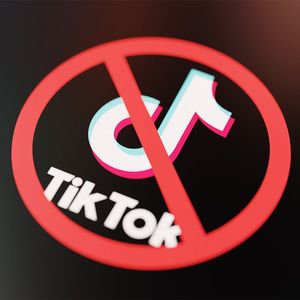Zoe Dolan knows her line of work doesn't make her popular, and her job requires an expertise in deftly combating arguments with counterarguments. Both on and off the job she faces criticism for defending those who are accused of seeking to harm the U.S.; some even call her a traitor. But Dolan says her work provides an important service: "Our Constitution guarantees the right to legal defense for anyone charged with a crime."
Dolan, a criminal defense attorney who practices in New York and Los Angeles, has represented clients in some of the biggest cases in the country. In an article about one of these cases, The New York Times noted that she "is proficient in Arabic, has lived in the Middle East and is the only member of the defense team with a government security clearance."
She also just happens to be transgender.
The Times was reporting on the terrorism trial of Sulaiman Abu Ghaith, a son-in-law of Osama bin Laden and a Kuwaiti-born cleric who sat with Bin Laden in an Afghan cave hours after the attacks of September 11, 2001, and later became a fiery spokesman for the al Qaeda leader. Dolan was defending Abu Ghaith in the trial, which in March 2014 ended in conviction on three counts: conspiracy to kill Americans, providing material support to terrorists, and conspiring to do so. Abu Ghaith was sentenced to life in prison.
"I see my work as a commitment to defend the Constitution and a court of law," Dolan tells The Advocate, and she does not think of her gender transition as either a help or a hindrance to her work.
Dolan never disclosed being trans to Abu Ghaith, to any other client, or to a jury.
Sitting across from the attractive, sandy-haired 38-year-old in a booth at a Hollywood cafe, one might think she wouldn't have to come out if she chose not to; surfing her Facebook pictures, friends see a woman not afraid to bare her toned bikini body on a beach. She has what some trans men and women aspire to, what transgender businesswoman Angelica Ross calls "passing privilege."
Whether because of that privilege or not, Dolan has found herself at the heart of two of the biggest terror trials of our time -- before Abu Ghaith, there was Kareem Ibrahim.
Ibrahim, now 69, was convicted in 2011 of joining a conspiracy to blow up fuel lines at New York's John F. Kennedy Airport. For security reasons, Dolan says she can speak more freely about that trial than her representation of Abu Ghaith. She decided to write about her experiences in court in a new memoir, There Is Room for You: Tales From a Transgender Defender's Heart.
"What I saw happening in court appalled me," Dolan says. "At the end of the day, we had a client who wasn't allowed to tell his full story on the witness stand. And somehow the courts didn't have a problem with that."
In her book, Dolan explains in great detail how Ibrahim was recruited by informants in 2007 from his native Trinidad, where he was an imam, a Muslim religious leader. For his role in the aborted bombing, he was sentenced to life in prison in 2012. In 2013 he lost again on appeal. Dolan writes in her book:
"The principle at the heart of it all: imagine a prosecution arising from the work of a confidential informant in which you were stopped from testifying about your own prior statements, even the tidbits that the government cherry-picked to use against you at trial. Do we believe in hearing the whole truth, only when it suits us?
Underneath our defense to the rights for which Americans throughout history have shed blood and died, should we countenance lip service to ideals that paste over reality with words, words, words?"
Asked how that experience changed her, Dolan tells The Advocate, "I hope that one thing people will take away from my book is, 'Wait a minute. If this is the example we're setting, in any case, regardless of the charges, how do I feel about that? How would I feel if I were prevented from telling my complete side of the story, and I had given a statement to law enforcement, thinking I was going to help myself?' And [prosecutors] did what they did in that trial, which is that they take out pieces here and there, and they throw it at you but prevent you from adding back what was excluded from the trial."
Dolan asks, rhetorically, "Is that the system of criminal justice we want in this country?"
She knows a lot more about the wheels of justice than most defenders of accused terrorists. She has also represented clients in high-profile mob trials as well as low-level offenders, and Dolan was once a crime victim herself.
In January 2005, a man she knew sexually assaulted her in her home. She described the attack in terrifying detail in her memoir: "He held me in a headlock and whispered, 'You know what I want. Give it to me or I'm going to kill you.'"
She managed to escape his grasp and ran from her apartment, naked, to a neighbor's, chased by her assailant, wielding a baseball bat.
After much deliberation, Dolan reported him to police, and worked with the Brooklyn district attorney's office to file charges. She was familiar with that office because she had interned there; in fact, she came out to a woman in the D.A.'s office during an interview for that summer internship, before legally changing her name.
There she learned firsthand how rarely justice is served for those who need it most; her attacker successfully pleaded his case down to a misdemeanor. Dolan moved,and never saw or heard from him again, but her experience changed her forever.
"Ever since the assault," she wrote in her memoir, "I had developed a fear of being alone with a man or being too close to one at all, even in public."
Yet she moved on, even took in a male roommate, and moved forward with her law career, keeping her gender transition to herself for most of the past decade.
"I was concerned about narrowing my opportunities and not being able to pursue what I wanted to do despite my transgender identity," Dolan tells The Advocate. "My practice doesn't have anything to do with me being transgender and never really has."
But rather than be outed, she worked with a reporter at the Times in 2014 to come out publicly, which it turns out barely registered a blip in the Manhattan federal courthouse where she was working last year.
"One of the prosecutors on that [Abu Ghaith] case, along with some of my adversaries at the time, wrote to me and said very complimentary things," Dolan says. "One person asked me, 'Is your phone ringing off the hook with new business?' It doesn't really work that way with the media."
She wrote earlier this year in a Huffington Post essay about the irony involved in keeping her transgender identity secret yet asking clients "to be vulnerable and share their past with me. In order to help them, I ask them to bare their souls. ... Sharing my own story leaves me exposed, raw, and vulnerable to one truth above all: I am no lawyer without the clients I represent, and, like them, I am human first."
"Three months before the whole Time magazine 'Transgender Tipping Point' issue featuring Laverne Cox on the cover, I was the beneficiary of my own tipping point," Dolan says. "I'm really lucky."
And not for the first time. She tells of a harrowing experience at the turn of the century, when she realized the true value of her American identity on a trip to Egypt.
Dolan was there studying Arabic in May 2001, when security forces raided a floating gay nightclub and she was caught in the sweep. Dozens of men were arrested and imprisoned, and to those forces, she was just another man; this was just prior to her enrolling in law school and beginning her physical transition.
Caught in the grip of the arresting officer, she told him, "I am American."
"Those three words give meaning to what I do every day," Dolan told Al Jazeera last year. "I felt powerless, and vulnerable, in ways that I had never imagined possible. My life has been about standing up for what I believe ever since."
And when she's not working, Dolan writes and looks for love. "I am single as all hell," she says, with a gentle laugh. Just as she has bared her body in an Upworthy video to make a statement, she has bared her soul in her memoir, most of all when it comes to being a transgender woman looking to be loved.
Below, an excerpt from There Is Room for You: Tales From a Transgender Defender's Heart:
Adriano was all over me the moment we stepped in the door. My heart came apart a little as I placed my palms on his chest and drew away.
"I have something to tell you," I said. "Can we just sit down for a minute?"
We sat on the edge of my bed, a miserable excuse of springs and plastic that only a college dorm room can get away with. He took my hands in his and looked at me with such earnestness that I struggled to speak.
"What's wrong? Are you on your period? It doesn't bother me, really."
I laughed.
"Really."
I lifted my hand to his cheek and smiled.
"No," I said, "it's very different from that."
After I told him, he bolted up and looked down at me in rage.
"You're a man?" he shouted.
"'No, I'm trying to explain -- "
He tightened his fists. I thought he was going to hit me.
But he didn't. He just turned around and left.
I cried myself to sleep that night. My dreams had come true: I got to be Cinderella for an evening with a dashing young Italian man who was the cutest one in a room of so many others. The experience was beyond anything I had dared to imagine.
But greediness had spelled the end. I had stayed past midnight to dance a little longer with Adriano, which I should never have done. I had lost track of the ground while soaring through the sky. It was glorious, until everything fell apart. My gown had turned to rags, and I was covered in soot.



















































































